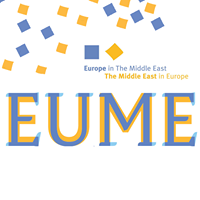EUME Berliner Seminar & BEYONDREST Conversation Series
»When the Subaltern is Forced to Speak: Colonial Knowledge Production Projects, Their Afterlives and the Im/Possibility of Historical Justice. The Case of the Berlin Lautarchiv«
https://tinyurl.com/2s3t43jy
Speaker: Alia Mossallam (Barenboim-Said Akademie / EUME Fellow 2017-25), Chair: Banu Karaca (BEYONDREST / Forum Transregionale Studien)
This event will be held in the Forum Transregionale Studien (Wallotstraße 14, 14193 Berlin) and online via Zoom. Please register via
ZXVtZSB8IHRyYWZvLWJlcmxpbiAhIGRl.
Login details for online attendance:
https://tinyurl.com/2s3t43jy
______________________________________________
The voice of Gilali, a Prisoner of War in the so-called ‘Halbmondlager’ in Wünsdorf, South of Berlin, in 1918, comes to us in long textured wails, through a digitized crackling recording, reaching across 107 years, from the experimental recording studios of the POW camp, into our present soundscapes. These recordings were solicited out of Gilali and his comrades as they were asked/made to sing, or speak into the gramophone in the ‘Halbmondlager’ housing POWs who served mainly as colonial subjects of the British and French militaries. The recordings were made in line with a scientific methodology with a prospective ‘listening’ in mind – one in accordance with the scientific and colonial objectives of building the ‘Lautarchiv’ (sound archive): furthering colonial sciences and possibly a “museum of world languages“.
In this talk, I will look at the layers of violence that stripped the stories from the storytellers, rendering them as archival objects in a colonial knowledge production project. I will look at ways to reverse or acknowledge this violence, to undo the “colonial fiction” that frames them, in order to liberate the recordings, and reinsert them into a process of communal listening and telling (within the communities the messages were possibly made for). Through collective listening sessions with scholars and musicians from the region, visits and workshops within the communities these recordings were from (in Tunisia and Morocco), I engage with the many stories and narratives these songs and stories can once again be part of, as they flow into communal practice. What kind of listening can be done in this context? How can we listen in solidarity with those we find cast ashore in the archives, ensuring (in the words of Arlette Farge) that we do not give them a second death? And how does the way we listen factor into our understanding and practice of restitution?
Knowing that no ultimate return is possible, what are the many different returns that can be experienced in the return of a sound archive? What possibilities do the return of stories, of “communal remains” (Azoulay), present for acts of restitution, and future legacies of solidarity and survival? In this seminar, we will experiment with three different listening strategies, guided by a listening in solidarity, hearing with the heart, and Tarab.
• Alia Mossallam is a cultural historian, educator and writer interested in songs that tell stories and stories that tell of popular struggles behind the better-known events that shape world history. For her PhD she researched a popular history of Nasserist Egypt through the stories and experiences of the popular resistance in Port Said (1956) and Suez (1967-1974) and the construction of the Aswan High Dam through the experiences of its builders and the Nubian communities displaced by it. As a EUME Fellow 2017-21 of the Alexander von Humboldt Foundation she worked on her book on the visual and musical archiving practices of the builders of the Aswan High Dam and the Nubian communities displaced by it. Her follow-up project at EUME (2021-24), "Tracing Emancipation Under Rubbles of War", retrieves the physical and political journeys of Egyptian and North African workers on the various fronts of World War I through the songs and memoires that recount their struggles. Some of her research-based articles, essays and short-stories can be found in The Journal of Water History, The History Workshop Journal, the LSE Middle East Paper Series, Ma’azif, Bidayat, Mada Masr, Jadaliyya and 60 Pages. An experimentative pedagogue, she founded the site-specific public history project “Ihky ya Tarikh”, as well as having taught at the American University in Cairo, the Freie Universität in Berlin, the Cairo Institute for Liberal Arts and the Humboldt-Universität zu Berlin. She is now an associate researcher at the “Towards Sonic Resocialization”-project at the Hermann von Helmholtz-Zentrum für Kulturtechnik and a distinguished visiting lecturer of Modern Middle East history at the Barenboim-Said Akademie, and remains an associated EUME Fellow in 2024-25.
• Banu Karaca works at the intersection of political anthropology and critical theory, art, aesthetics, and cultural policy, museum and feminist memory studies. She is the author of "The National Frame: Art and State Violence in Turkey and Germany" (Fordham University Press, 2021), and co-editor of "Women Mobilizing Memory" (Columbia University Press, 2019). She has published on freedom of expression in the arts, the visualization of gendered memories of war and political violence, visual literacy, and restitution. At the Forum Transregionale Studien, she directs the research group “Beyond Restitution: Heritage, (Dis)Possession and the Politics of Knowledge” (BEYONDREST) supported by a Consolidator Grant of the European Research Council.
This event is part of the conversation series "Restitution and its Vantage Points: Beyond the Preservation Paradigm" of the Research Group "Beyond Restitution: Heritage, (Dis)Possession and the Politics of Knowledge" (BEYONDREST). More information:
https://www.eume-berlin.de/projekte/beyond-restitution-heritage-dispossession-and-the-politics-of-knowledge-beyondrest
Also check out other Arts events in Berlin, Workshops in Berlin, Business events in Berlin.
